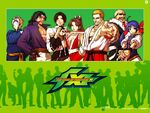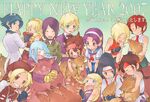The King of Fighters XI (KOF XI) is the eleventh installment of The King of Fighters series. The game continues the story of The King of Fighters 2003. Its tentative title was The King of Fighters 2004 though this name was debunked by the end of 2004. The numerical distinction for the series is based primarily on SNK Playmore wanting to avoid being locked into a rigorous yearly schedule of releases.
Storyline
Mukai, a member of a mysterious group, stole the Orochi seal in the last tournament and broke it, causing confusion and destruction to happen from within sight. Taking advantage of the situation at hand, Ash stole the Yata Mirror from Chizuru and drained her powers in the process. In the advent of a new KOF tournament, new faces are handed invitations, while old faces, such as Eiji Kisaragi, return to the ring. Among the new KOF participants are Oswald, Duck King (a South Town veteran fighter himself), Momoko, and Elisabeth. All these fighters will find themselves in a tournament full of mysteries and secrets started by motives that they’d ignored. Behind this healthy competitive tournament hides a hidden force called "People from the Past" with a mysterious goal.
Game Mechanics
Aside from the already known gameplay maneuvers that add much depth to the gameplay, Runs, Rolls, Short Jumps, Guard Cancel CDs and Rolls, Empty Cancels, and the returning Quick Emergency Roll, the four largest innovations KOF XI brings to the franchise are the Quick Shift, the Saving Shift, the Skill Gauge and the Dream Cancel.
The Skill Stocks significantly complicate the gameplay of KOF. The Power Stocks that existed previously are still present, and are filled in the usual fashion. Nevertheless, there are now Skill Stocks as well, which gradually build up over time. Each team begins a match holding the maximum of two Skill Stocks. Offensive maneuvers, such as Desperation Moves, Guard Cancels, and Tag Attacks, continue to use Power Stocks. However, more defensive or tactical maneuvers, such as Guard Evasion, Saving Shift, and Quick Shift, use Skill Stocks.
KOF XI utilizes the Tactical Shift System from KOF 2003, but makes very important changes. The Quick Shift allows you to change into another character in the middle of any combo, prolonging it, or in the middle of any attack, no matter if it was blocked or not, canceling the frames of animation of the attack, if it's needed. The Saving Shift allows the player to take out a character when he is being hit as soon as he is hit, or in any moment, at the cost of both skill bars. This effectively cuts many combos that otherwise would do a lot of damage, eliminates the possibility of infinities by repeating chains of attacks on the ground (excluding aerial juggles) and brings an element of balance to the game. While it is possible to escape from any combination of attacks on the ground, it is not possible to use Saving Shift to get out from a Desperation or Leader Desperation move.
The last new feature of KOF XI is the Dream Cancel. Like the Super Cancel that first appeared in KOF '99, Dream Cancel allows players to use stocks to interrupt a move in the midst of its execution with a more powerful move, allowing devastating combos; however, the Dream Cancel is more deadly than ever, allowing a DM to be canceled into an LDM, at the expensive price of two Power Stocks and one Skill Stock.
Should the timer run down in a match, the winner is no longer decided based upon who has the most life remaining. Instead, the judgment bar, a new bar of circular shape composed of two colors, each one representing one player (red or blue, which are the colors displayed in the portraits of the characters of each side) acts as a quantifier of the skill of each player. Whichever player has the judgment bar towards his side will be the victor if none of the teams win defeating all three characters from the opposite team; rarely, if the bar is exactly in the center, the match will end in a draw and both sides will lose. The bar is affected by each attack that the players get in, combos affect progressively more, and when a character of the opposing team is defeated, the bar suffers a big change against that player. This makes taking care of keeping one's characters alive pretty important, giving strategy to the tags system.
Characters
Hero Team
Fatal Fury Team
Art of Fighting Team
Ikari Warriors Team
Neo Psycho Soldiers Team
K' Team
Agent Team
Mark of the Wolves Team
Anti-Art of Fighting Team
Rivals Team
Kyo & Iori Team
Mid-Bosses
PS2 Special Edit Teams
Unrequited Love (?) Team
- Sie Kensou
- Ramon
- Robert Garcia
Justice Team
- Kim Kaphwan
- Tizoc
- Athena Asamiya
KOF Heroes Team
- Kyo Kusanagi
- K'
- Ash Crimson
2003 Heroes Team
- Ash Crimson
- Duo Lon
- Shen Woo
Girl Team
- Kula Diamond
- Momoko
- Athena
Bird Team
- Duck King
- Tizoc
- Jyazu
'96 Art of Fighting Team
- Ryo Sakazaki
- Robert Garcia
- Yuri Sakazaki
Punishment Team
- Whip
- Elisabeth Blanctorche
- B. Jenet
Older Brother Team
- Adelheid Bernstein
- Gato
- Ryo Sakazaki
"Older Sister" Team
- Vanessa
- Elisabeth Blanctorche
- King
Buriki One Team
- Gai Tendo
- Ryo Sakazaki
- Silber
Ninja Team
- Eiji Kisaragi
- Mai Shiranui
- Jyazu
Currently Reforming Team
- Kim (as the leader)
- Next two members can either be:
- Ash Crimson
- Iori Yagami
- Shion
- Magaki
- Silber
- Jyazu
- Geese Howard
- Mr. Big
New Challenger Team
- Any team solely composed of PS2 exclusive characters
Stages
Gallery
External Links
| This page uses Creative Commons Licensed content from Wikipedia (view authors). |












